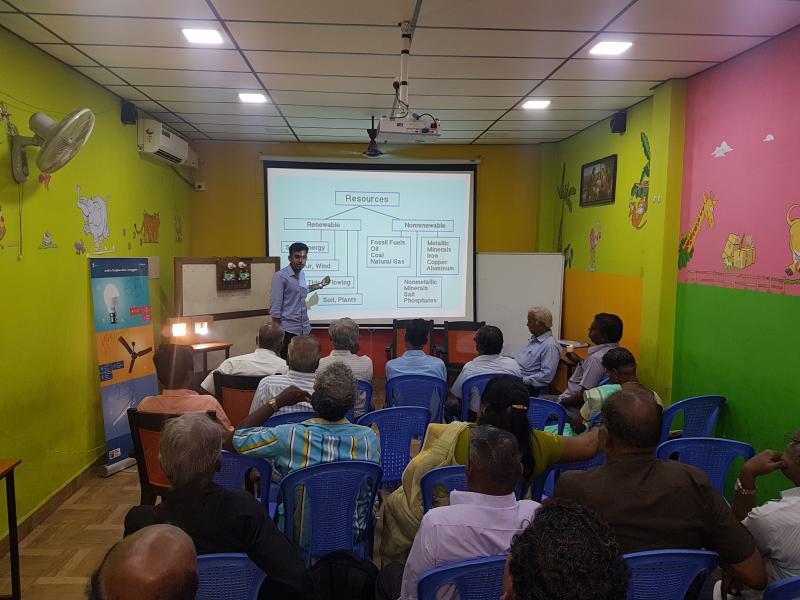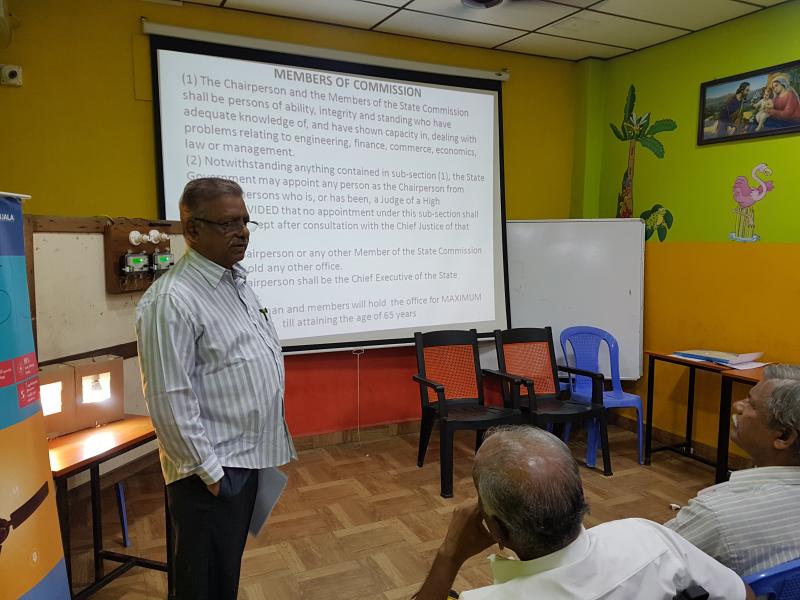Date and Time: 22/04/2017, 10 AM to 2:30 PM
Organizer: ECC Tiruvallur
Managed by: Madras Metropolitan Consumer Rights Protection Centre (MMCRPC)
Description: To create awareness about key issues of electricity regulation and governance. Demonstration on energy efficiency and advantages of on grid solar energy for household sector
Speakers:
- Mr Selvaraj, Trustee MMCRPC
- Mr Ashokan ECC Tiruvallur Expert
- Mr Dhanraj ECC Tiruvallur Coordinator
- Mr Sam ECC Cuddalore Coordinator
- Mr Shanmugam ECC Tirunelveli Expert
- Mr Venkatachalam ECC Tirunelveli Coordinator
- Mr Sivakumar State level ECC Expert
- Mr Gunasekaran State level ECC Expert
- Mr Gautham, Top Solar, Renewable Energy Entrepreneur
Participants: Local EB officials and local consumers
Location: St Mary’s Nursery and Primary School, Old Washermenpet
Key Points of Discussion:
ECC state level experts Mr Gunasekaran and Mr Sivakumar presented a talk on the regulatory commission, implications of the recent ARR tariff petition and some financial aspects of TNEB. Renewable Purchase Obligation (RPO), the mandated share by TANGEDCO to purchase power from renewable sources of energy, needs some clarity as there is general ambiguity in distinguishing between solar and non-solar RPO. RPO needs to be strictly mandated and overlooked to achieve the yearly targets.

Tamil Nadu, Uttar Pradesh and Rajasthan are financially the worst performing states. The Transmission and Distribution (T&D) losses figures are dubious and should be estimated correctly for better forecasting of demand and supply. The awareness about the sector is not only low among the consumers but also among the officials. Despite increasing capacity additions, some places in rural and semi urban areas still face frequent power cuts and this is primarily attributed to the lack of human resources and purely giving importance to technology. Another important reason for the deterioration of the utility is the lack of coordination among the officials in implementing policies and attending consumer complaints.
The speakers jointly stated that it was truly interesting to see strong support and interest of the local EB officials in creating awareness to the consumers. A resource person from the TNEB briefed upon energy efficiency and demonstrated consumers about reducing electricity charges by switching from incandescent bulb to energy efficient LED bulbs.
They also took initiatives to distribute pamphlets on energy efficiency in the local language and set up a stall that sold fans, LED bulbs ad tube lights promoted by the Energy Efficiency Services Limited (EESL), a central government body. The consumers got brief understanding about energy efficiency and how one can reduce carbon footprint and at the same time pay less for the electricity used. A solar energy entrepreneur demonstrated on the advantages of grid connected solar rooftops and how exactly solar panel works.

ECC Tirunelveli expert Mr Shanmugam raised his concerns about the differences in the functioning of the EB in the rural and urban areas. He made it a point that the services in the rural areas need to be rendered in the same way as it is in urban areas and requested the officials not to misuse the weakness of the rural population. The local EB officials also directly interacted with consumers and requested the consumers to cooperate with them during critical times in order to handle their complaints efficiently.
During the discussion on queries related to tariff, the experts stated that the political scenario is very sensitive in Tamil Nadu and unfortunately the government intervention in policy matters is high and there is little say by the TNERC in key matters relating to subsidies and tariff. The amendments relating to cross subsidy in the Electricity Act 2003 can easily be changed as per interests of the government and utility. This needs immediate attention. Tamil Nadu is one of the few states that is very much reluctant to increase tariff and keeps the rates mostly in status quo. The government keeps tariff for the domestic sector at very low and charges relatively high price for commercial and industrial sector i.e. cross subsidy. This cross subsidy seems to be high in Tamil Nadu and hence lot of industries is going out.